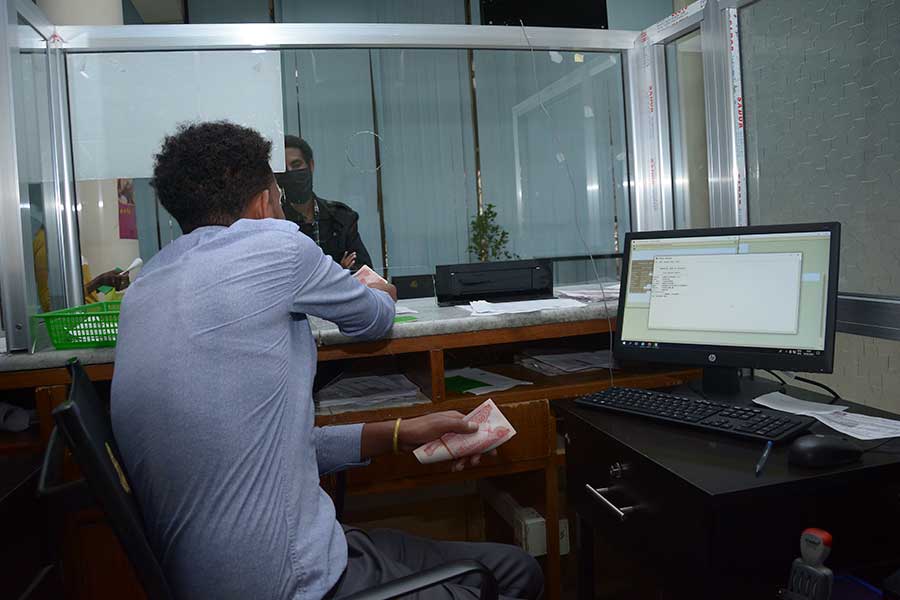
Viewpoints | Nov 16,2019
Commercial banks are struggling to complete a mandatory requirement of the central bank to know their clients as the latter granted them breathing room extending the initial deadline set for last month.
Regulators at the National Bank of Ethiopia (NBE) have notified the presidents of commercial banks that they have two additional months to complete details such as a tax identification number (TIN), average monthly income, and occupations under depositors' account information. Communicated through text messages, the move comes after commercial banks submitted progress reports last week, along with a list of accounts that have thus far been deactivated for lack of information.
The NBE has instructed banks to reopen blocked accounts.
The central bank had initially assigned commercial banks, microfinance institutions, and payment instrument issuers six months to comply with the requirement, with the deadline set for February 2022. In the absence of an integrated national identification regime, compliance has proven unattainable.
Commercial banks have contacted their clients to gather the data over the past few months. Despite the outreach, they have failed to collect the required information from a large chunk of their client base. The 20 commercial banks host an estimated 45 million accounts, with aggregate deposits topping 1.5 trillion Br.
Commercial banks petitioned regulators for an extension since the deadline passed two weeks ago. Depositors are rarely notified when accounts with incomplete data were blocked, realising their accounts have been suspended attempting to make transactions. Up to 30pc of all accounts had been frozen, an executive at one of the private banks told Fortune, on condition of anonymity.
Branches were jammed last week with clients lined up desperate to provide missing information to have their accounts reopened.
"It's not what we expected, but the number is large," says Melaku Kebede, president of Hibret Bank.
Hibret serves over 1.5 million customers through 400 branches.
Abdulmenan Mohammed, a financial expert, argues that although governments commonly implement know your customer (KYC) rules to fight money laundering, freezing millions of accounts is "not helpful at all."
The expert contends it would serve only as an additional burden for an already beleaguered economy while undermining trust in banks and encouraging cash hoarding. At the end of the previous financial year, the cash circulating outside banks had reached 133 billion Br, exhibiting an 18pc annual increase.
The bulk of bank accounts is with the state-owned Commercial Bank of Ethiopia (CBE). It has thus far collected and validated information for 20 million of its 36 million accounts, according to Fikreselassie Zewdu, vice president for branch and digital banking. Four-fifths of the remaining accounts were found to be inactive, he disclosed.
Regulators have cited the new rules to enforce regulations such as transaction limits better and address illicit transactions in the banking system. However, executives say the task has posed a challenge to them.
Fikresilassie attributed the difficulties to accountholders' reluctance to provide information.
Senait Teshome, a woman in her early 50s, is among those whose accounts were recently blocked. She holds two accounts with the CBE. A branch in the Wossen neighbourhood of Yeka District had called her weeks back, requesting she come to the branch and provide information.
"I went because it's close to my home," she said. "I didn't think my other account needed to be verified as well."
However, Senait discovered the second account had been frozen when she attempted to make a transfer. Last week, she visited a CBE branch in the Lancia area to sort things out. She encountered a long queue as the branch struggled to serve the hundreds of clients that poured in to provide their information. The crowd was partly CBE's own doing, as the Bank had posted various announcements on social media advising clients to visit a branch before the end of the week. It has since been announced that clients can provide the information at their leisure, though their accounts would be proscribed from conducting digital transactions in the meantime.
"We've been accepting as many as 400 forms a day," Habtamu Mekonnen, manager of CBE's Lancia branch, told Fortune. "The number will probably grow today [Friday]."
The process is slightly more complicated for Wegagen Bank. Around a quarter of its 2.2 million accounts were registered in the Tigray Regional State, where its branch network has been inactive due to the war. It has thus far cleared data for around 26pc of its account holders.
Wegagen Bank has noted the challenges it faced in a report its executives submitted to the NBE last week, according to Mengsitu Tadesse, director of resource mobilisation and branch banking. The unavailability of identification renewal services at local administrative offices and the absence of methodology to verify some of the information provided by clients have made the work difficult.
Banks have also been tasked with identifying duplicate accounts and organising them under a unique ID. Regulators want to impose transaction limits on customers using the unique ID.
Two months ago, the central bank lifted the transfer restriction in place since last January. Customers had been limited to five transfers a week. However, withdrawal limits remain in place. Personal accounts are capped at 100,000 Br a day, while businesses can withdraw up to 300,000 Br. A customer with multiple accounts would be subject to the restrictions as a sum of all the accounts.
The CBE has identified eight million accounts as duplicates, Fikresellasie disclosed. Around 90pc have been verified.
Hibret Bank has an in-house system, using software that can identify duplicate accounts using scans for images and signatures.
The work could have been easier had there been a standard for the type of identification (ID) clients used to open accounts, bank executives argue.
"The solution is a national ID," said Fikreselassie.
Several banks recently partnered with the federal government to pilot a national identification card programme initiated more than a decade ago. They are tasked with carrying out the registration, which involves gathering primary data and biometric information such as photographs, fingerprints and scans. The NBE expects to see banks set up KYC departments led by managers to ensure compliance and the approval of newly opened accounts.
Abdulmenan argues that the existing risk and compliance departments at commercial banks are more than capable of monitoring transactions and implementing KYC rules.
There are holes in the NBE directive as well. Though it states that failure to deactivate accounts with missing information would entail a 50,000 Br fine for banks, it does not specify how to handle clients residing abroad.
PUBLISHED ON
Mar 12,2022 [ VOL
22 , NO
1141]

Viewpoints | Nov 16,2019

Editorial | Jul 01,2023

News Analysis | Mar 16,2024

Fortune News | Sep 19,2020

My Opinion | Aug 10,2024

Fortune News | Sep 22,2024

Radar | Oct 23,2023

Fortune News | Jul 13,2024

Fortune News | Nov 03,2024

Radar | Oct 17,2020

Dec 22 , 2024 . By TIZITA SHEWAFERAW
Charged with transforming colossal state-owned enterprises into modern and competitiv...

Aug 18 , 2024 . By AKSAH ITALO
Although predictable Yonas Zerihun's job in the ride-hailing service is not immune to...

Jul 28 , 2024 . By TIZITA SHEWAFERAW
Unhabitual, perhaps too many, Samuel Gebreyohannes, 38, used to occasionally enjoy a couple of beers at breakfast. However, he recently swit...

Jul 13 , 2024 . By AKSAH ITALO
Investors who rely on tractors, trucks, and field vehicles for commuting, transporting commodities, and f...

Jun 28 , 2025
Meseret Damtie, the assertive auditor general, has never been shy about naming names...

Jun 21 , 2025
A well-worn adage says, “Budget is not destiny, but it is direction.” Examining t...

Jun 14 , 2025
Yet again, the Horn of Africa is bracing for trouble. A region already frayed by wars...

Jun 7 , 2025
Few promises shine brighter in Addis Abeba than the pledge of a roof for every family...